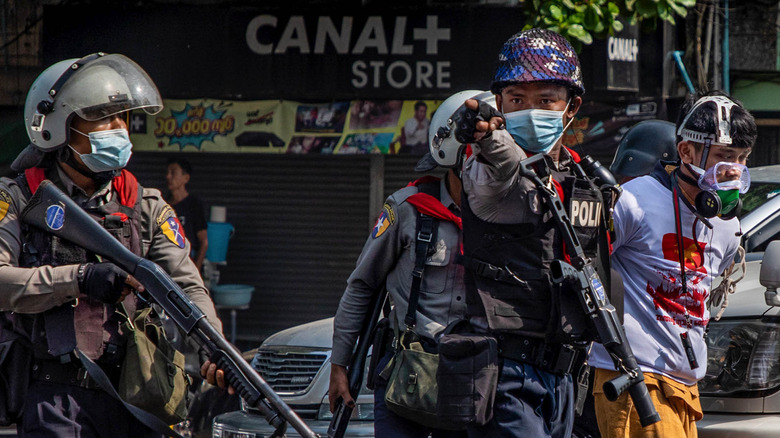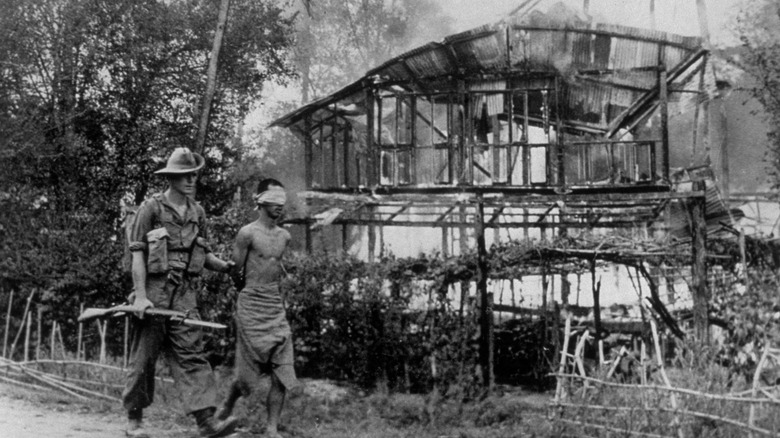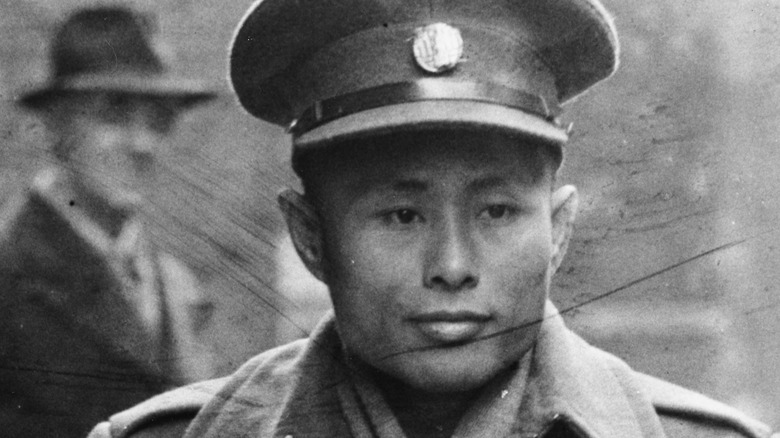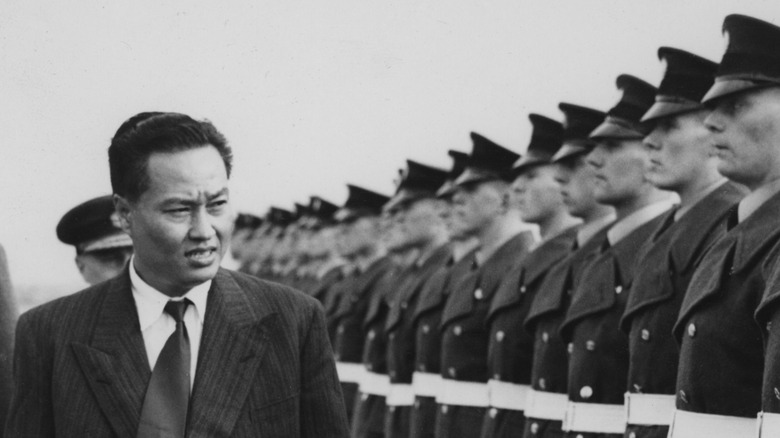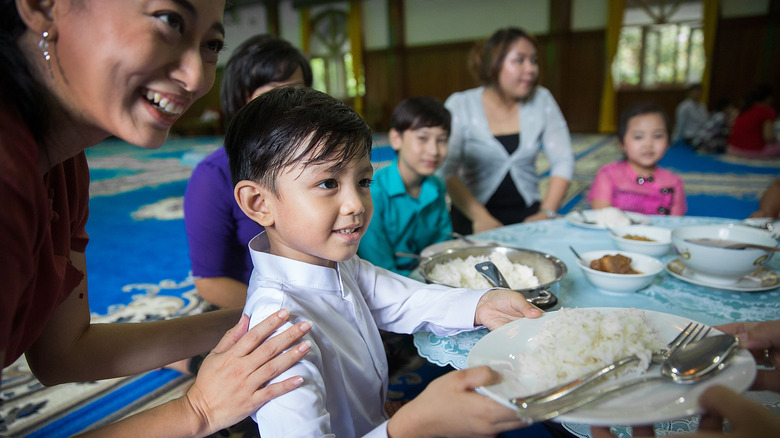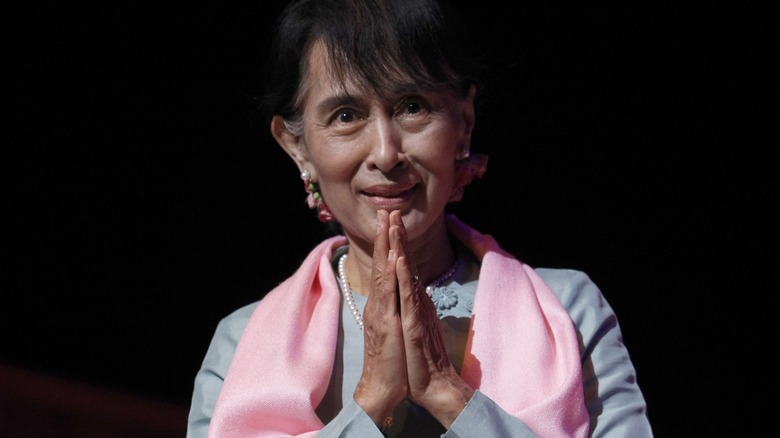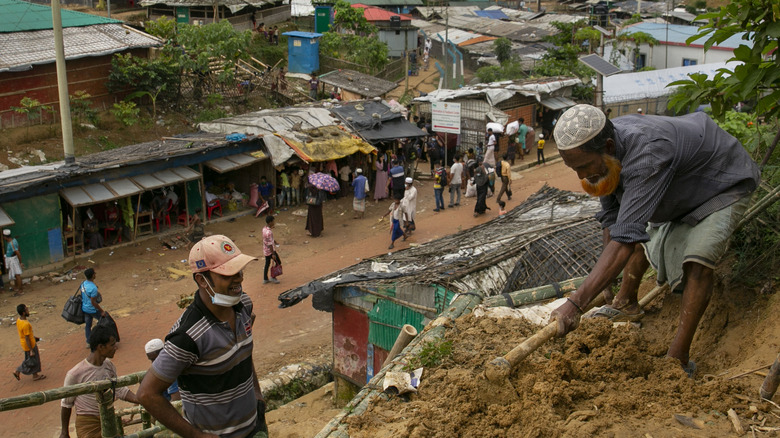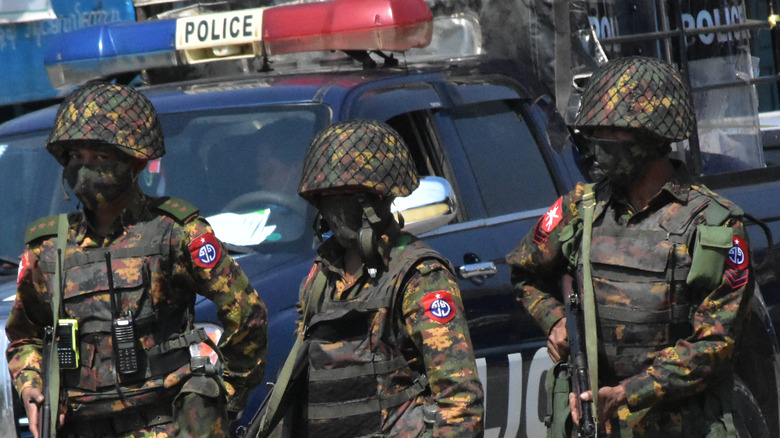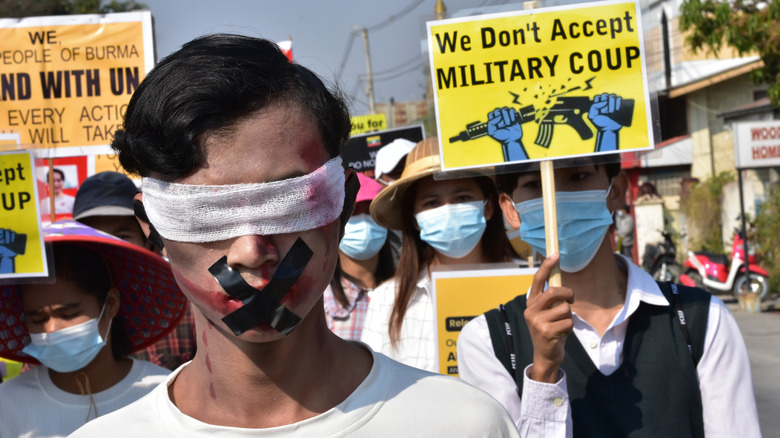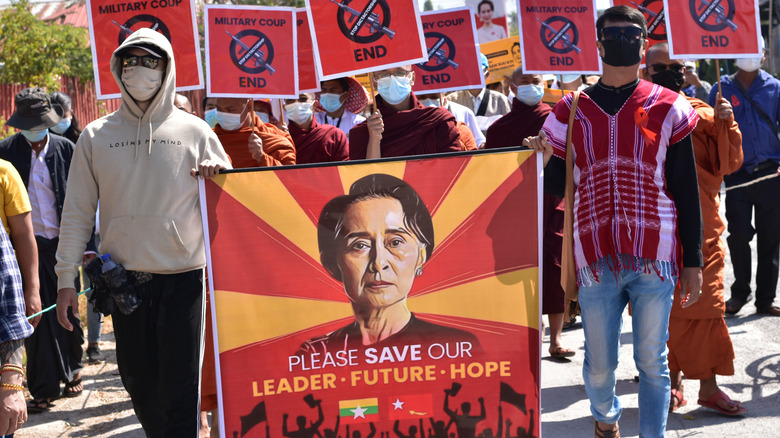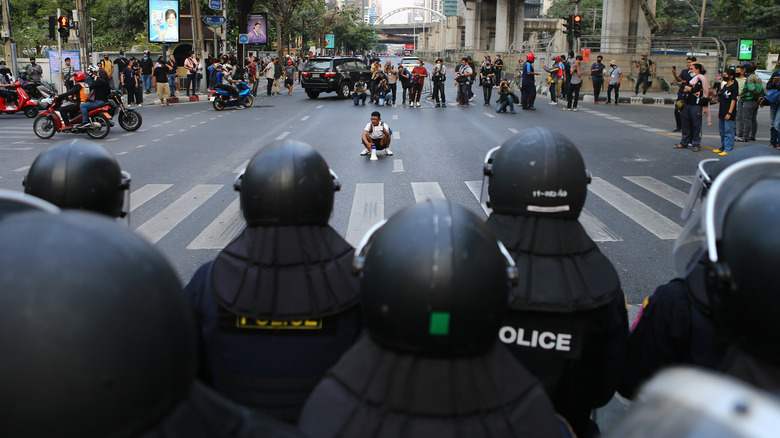The Untold Truth Of Myanmar's Military Government
At the end of the 20th century, Myanmar seemed poised to turn a corner. True, the military junta refused to honor multiparty elections — the first held in 30 years, according to Britannica – moving the United States to issue sanctions. But cease-fires were initiated between the Tatmadaw (military) and myriad insurgent groups that have warred for decades, and trade increased along the country's borders. Leaders of the political opposition were released from house arrest, leading to negotiations that freed a slew of less prominent political prisoners. China and India increased their support for the military (hoping to compete with one another for influence). And in 2008, after several false starts, a new constitution went into effect, paving the way for multiparty elections in 2011.
For 10 years, Myanmar made steps toward a democratic system with an international presence. Fairness in elections increased, the cease-fires went nationwide, and international sanctions were eased. Modest economic reforms were enacted, with more to come, and constitutional amendments to gradually reduce the military's presence in the legislature were proposed. But the amendments failed, and the Tatmadaw's violence toward minority groups brought international condemnation. In 2020, when elections didn't go the way the Tatmadaw hoped, they claimed fraud and seized full control of the government the following year. As of July 2022, Myanmar remains in a state of emergency under junta control (per Bloomberg).
Tensions in British Burma
Myanmar has long been known as Burma in the English-speaking world, for its dominant ethnic group and language. United in 1057 (per New Internationalist), Burma's territory waned and waxed through various dynasties and invasions, with the monastic community of the Sangha, an order of Theravada Buddhist monks, maintaining significant political power. In the 19th century, Burma fought three wars with the British Empire over territory along their border with India, ending with the British annexation of Burma into British India. Opposition to colonial subjugation was answered with wholesale destruction of villages, and the British manipulated local conflicts to their own ends.
The latter tactic brought greater welfare and opportunity to Burma's ethnic minorities, sometimes at the expense of the Burmans, according to Harvard Divinity School. The British introduced a secular school system to compete with the education offered by the Sangha. It was within Buddhist communities that nationalist and anti-colonial sentiment revived in the 1920s. During World War II, divisions within Burma deepened as minority groups allied with Britain in exchange for promises of autonomy, and Burmese nationalists initially accepted Japanese support for an uprising. When it became clear that a deal with Japan meant accepting another colonial master, and that Japan was losing, nationalist leader Aung San switched sides to the Allies.
The war devastated Burma's infrastructure. Calls for independence were realized in 1947, but anti-British sentiment among the Burmese was so high that Burma refused to join the Commonwealth of Nations.
The military came to power early
According to New Internationalist, Burmese independence went into effect on January 4, 1948, at 4:20 a.m. The time was chosen by an astrologer who deemed it auspicious. But signs of a more earthly kind the previous year offered a warning for the future of Burma: Nationalist leader Aung San, whose political party (the AFPL) had swept the elections for an interim government, was assassinated along with most of his cabinet. The government came into the hands of U Nu, Burma's first prime minister.
Under U Nu, the government pursued economic recovery efforts, internal peace, and international neutrality (per Britannica). It could not always successfully maintain the latter goals, though. Despite promises of unity, several political and ethnic groups felt excluded, and they began insurgencies that persist to this day. In response to tensions within China, its northern neighbor, Burma rejected foreign aid after the United States lent support to Taiwan. Still, Burma maintained a parliamentary system and seemed on the road to stability by the end of the 1950s.
In the time since independence, however, the AFPL had fractured. U Nu encouraged Aug San's one time right-hand man, General Ne Win, to become prime minister in 1958, whereupon Ne Win purged the government and brought agitating minority groups under his thumb ahead of the 1960 elections. U Nu returned to the premiership with a clear majority in parliament, but two years later, Ne Win staged a military coup.
From Burma to Myanmar
Having come to power through a coup d'état, the Burmese military under General Ne Win suspended the 1947 constitution and instituted a one-party socialist state under the pretense of maintaining national unity (per Britannica). The new government curtailed press freedoms, neglected agriculture for industry, and renewed persecution of minority groups. Many Burmese citizens of Indian descent fled the country after 1962 (per the BBC), and those who remained faced expulsion, possibly motivated by Ne Win's resentment against Indian traders from his days in business (per New Internationalist).
Under the junta, led by personnel unlettered and disinterested in economics, Burma suffered a severe decline. The proclamation of a new constitution in 1974 and an easing of isolationist policies helped alleviate matters somewhat, but by the 1980s the country was back in financial woes. Ne Win's offer of amnesty to insurgents brought former prime minister U Nu back from exile in India, but most of the active insurgents within Burma's borders continued to fight.
If Ne Win's junta couldn't win peace or manage the economy, they could stoke lingering resentment for the colonial period for their own ends. After a crackdown on pro-democracy demonstrations brought international condemnation, the junta changed the country's name to Myanmar, arguing that "Burma" was a legacy of the British Empire that excluded non-Burmese citizens. Per AP, the change only mattered in English; "Myanmar" is just a formal term for "Burma" in Burmese. And Washington continues to call the country Burma.
The Burmese ethnic conflict(s)
According to the Council on Foreign Relations, 68% of Myanmar's population is Burmese, with six ethnic groups holding sizable minorities and five percent of the population made up of a smattering of others. The insurgencies that have waged in Myanmar since independence are in large part due to tension between the Burmese majority and other ethnicities. There is a religious dimension to the conflict as well; almost 90% of the population is Buddhist (per Harvard Divinity School), with other religions represented most strongly within ethnic minority communities.
During British rule, divisions between various groups were more sharply — and artificially — defined based on now-outdated theories of race (per Crisis Group). Britain's "divide and rule" strategy for maintaining control led to their governing several ethnic groups separately from the majority Burmese, with little regard for historical and cultural differences on the local level. Several of these groups saw increased opportunity and influence under British rule, but the policy left the country ill-equipped to achieve unity after independence. Even the split of colonial Burma off from India in 1937 was contested along ethnic lines, with minority groups correctly guessing that such a split would mark a far less hospitable political climate for them.
The 1947 constitution promised autonomy to minority states after 10 years, but the parliamentary government reneged on the deal, according to New Internationalist. This, and the junta's later ramping up of persecution of minority groups, only fueled the insurgent groups.
A democratic dalliance
After General Ne Win relinquished power in 1988 amidst deteriorating economic conditions, Myanmar saw widespread demonstrations for a movement toward democratic government, according to New Internationalist. The protests were met with gunfire and the declaration of martial law. But 1988 also saw the return to Myanmar of Aung San Suu Kyi, the daughter of Aung San. On arrival, Suu Kyi helped to organize continued resistance to the junta through non-violent protests. Her NLD political party won a substantial majority in the 1990 elections, leading the military to place Suu Kyi under six years' house arrest (per the BBC).
Suu Kyi would periodically go back under arrest after her release in 1995, and when a new constitution took effect in 2008 and an elected government came to power, new election laws were created to keep her from running for office. Suu Kyi is married to a British citizen, and marriage to foreign nationals was declared a disqualification (per Britannica). After the NLD won in the 2015 elections, it got around this by creating the non-elected position of state counselor, allowing Suu Kyi to act as de facto head of government while her friend Htin Kyaw sat as nominal president.
But while the NLD won a fairly contested election and prepared a legislative agenda, this was only a step toward democracy. Per the 2008 constitution, the Tatmadaw retained a quarter of the seats in the legislature and remained the most powerful institution in the country (per Vox).
The loss of a peace prize
Among the most heated conflicts within Myanmar concerns the Rohingya, a Muslim ethnic minority historically concentrated in the western Rakhine state (per the Council on Foreign Relations). The Rohingya have had a presence in Myanmar since the 15th century, but a substantial wave immigrated during British rule, a fact that has been used against them by the junta; it has claimed that all Rohingya are illegal Bangladeshi immigrants. The name has only been in use since the 1950s as a way for the group to self-identify, and it has gone unrecognized by the government.
Discriminatory policy targeted at the Rohingya has been in place since 1948, with the junta expanding the discrimination after seizing power. Things escalated in 2017 when a Rohingya insurgency's attack on police posts became a pretext to attack civilian communities. Nearly 7,000 people were killed within a month. A U.N. report argued that the Tatmadaw could be prosecuted for genocide at the International Criminal Court and dismissed all of Myanmar's internal assessments of the situation (per the BBC).
State counselor Aung Sang Suu Kyi's response to the atrocities was at first silence, then a defense of the Myanmar military. She had no authority to curb the Tatmadaw's actions, but her tacit acceptance of their campaign disappointed many who had seen her as a champion of democracy and civil rights. Amnesty International stripped her of its Ambassador of Conscience Award, their highest honor, in response (per the BBC).
Back to the junta
Aung Sang Suu Kyi's long campaigns for democracy did not translate into transformative governance when her NLD political party came to power in 2015. The Tatmadaw retained significant power under the 2008 constitution, including a quarter of seats in the legislature that gave it an almost unassailable veto over any proposed amendments to its authority (per Vox). Suu Kyi's ability to check their power as state counselor was also limited. At times, she seemed disinclined to try; she voiced no opposition to the Tatmadaw's campaign against the Rohingya, prosecuted journalists, and strengthened her own hold over the NLD more than she did Myanmar's civilian government (per the Council on Foreign Relations).
Still, the NLD's electoral success in the 2015 and 2020 elections took the Tatmadaw by surprise. The armed forces maintain a separate existence from civilians and may not have seen the NLD's growing popularity through their bubble. Or, they may have counted on the 2008 constitution to legitimize their power through elections. In any event, after a decisive victory for the NLD in 2020, the Tatmadaw cried election fraud, a charge international observers reject. Under that pretext, a new junta seized control of the government hours before the new parliament was scheduled to begin its session in 2021. According to Reuters, 24 ministers were removed, and Suu Kyi and other NLD leaders were arrested. The junta declared a state of emergency that, as of July 2022, is still in effect (via Bloomberg).
Resistance came up quick
After the Tatmadaw instigated a coup in 2021, there was no immediate panic among the citizenry. Significant portions of the population had lived through the 1962 coup and the 1988 crackdown, according to Vox. But Aung San Suu Kyi urged the people of Myanmar to reject the Tatmadaw's latest power play, and other leaders of the NLD (National League for Democracy) joined her in calling for nonviolent resistance.
Their words stirred movement throughout Myanmar, and among its diaspora. The world of telecommunications had changed significantly since the Tatmadaw's past coups; their blackout couldn't keep news from traveling. Across social media, according to Brookings, spoke out against the junta. On the ground, citizens took advantage of their expanded freedom of speech from the years of quasi-democracy to protest. A no-work movement obtained hundreds of thousands of supporters. Connections to international activism networks were utilized, as were broadcast space on global radio platforms.
Still, there were fears that resistance could turn violent. Suu Kyi is an incredibly popular figure in Myanmar as a leader and as the daughter of Aung San, particularly among the Buddhist Burmese majority. The Washington Post described her status within the country as "godlike," despite disappointment among young people and minority groups with her record on advancing democracy. Her party had won the 2020 election in a landslide. With Suu Kyi imprisoned and the NLD displaced, some observers fretted that there could be armed resistance in their defense.
Aung San Suu Kyi's secret trial
When the Tatmadaw arrested Aung San Suu Kyi as part of their coup, it was nothing she hadn't been through before. She had gone under house arrest in 1990 for six years, with periodic detentions since. As far back as her infancy, her family faced danger from militant forces in Myanmar; her father Aung San was assassinated when Suu Kyi was only 2 (via Britannica). When the position of state counselor was created for her in 2015, the Tatmadaw protested that it was an unconstitutional workaround the conditions barring Suu Kyi from the presidency (per Britannica).
After the 2021 coup, there were no charges on that score. Instead, according to the Guardian, Suu Kyi was accused of incitement, voter fraud, corruption, violating COVID-19 restrictions, and illegally importing walkie-talkies to communicate. The charges are to be deliberated over several trials, which remain ongoing as of July 2022. The press has been barred from covering them, the defense attorneys are barred from speaking publicly about it, and the location of Suu Kyi herself remains unknown. The first verdict, handed down at the end of 2021, gave her two years' house arrest; a second, at the beginning of 2022, added another four. It's conceivable that Suu Kyi, at 77 years old, will be condemned to spend the rest of her life imprisoned.
The return of executions
For all else that can be said about the Tatmadaw, it was not — at least since 1988 — prone to summary executions. Though it kept capital punishment on the books, Myanmar went almost 34 years without any legal executions. This was enough for Amnesty International to name the country "Abolitionist in Practice" in 2018 (per Amnesty International). That hardly meant there was no state violence; the year before AI made the designation marked the military's campaign against the Rohingya (per the Council on Foreign Relations). But the Tatmadaw did not officially wield death as a punishment against its opposition.
That changed in 2022, when four pro-democracy figures were executed after secret trials (per the BBC). Two were charged with being party to "conspiracies for brutal and inhumane terror acts." The first of these was Phyo Zeya Thaw, a former member of parliament whose mother had been allowed to bring him money and goods in prison the day of his execution. "I didn't believe it," she told the BBC. There was no advance notice and no chance to plan a proper funeral for her son. The other executed on the conspiracy charge was Kyaw Min Yu, known as Ko Jimmy, a veteran of the 1988 demonstrations for democracy.
The other prisoners were executed on a charge of killing a junta informer. Aung San Suu Kyi expressed sadness through a source, and the shadow government resisting the junta expressed outrage, but no retribution could immediately be taken.
